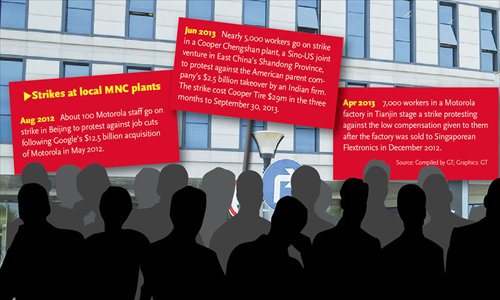HOME >> BUSINESS
Workers strike at IBM factory in Shenzhen
By Li Qiaoyi Source:Global Times Published: 2014-3-6 23:28:01

An IBM factory in Shenzhen, South China's Guangdong Province, has been hit by a massive strike, as some 1,000 workers protested the terms of their upcoming transfer to Lenovo in the wake of the announcement of Lenovo's $2.3 billion acquisition of IBM's x86 low-end service segment, the Financial Times (FT) reported Thursday.
The protests commenced Monday, according to the report, citing a worker who required not to be named. Production in the Shenzhen manufacturing facility remained suspended, said the worker.
A search for the strike on Sina Weibo revealed a few posts dating back to Monday, which contain photos and videos showing crowds gathering in front of the factory holding protest banners.
E-mailed questions sent to IBM China seeking confirmation and further information went unanswered by press time.
Lenovo could not be reached for comment on Thursday when contacted by the Global Times.
With the deal, IBM looks to refocus on its powerful mainframe and storage business, while Lenovo, which is already the world's No.1 PC manufacturer, is expected to be catapulted to the top spot or vendors of x86 servers in the Chinese market, the US-based market research firm IDC said in a note sent to the Global Times after the announcement of the acquisition, in late January.
"Employees currently involved in x86 operations in Shenzhen have a personal choice of going to Lenovo under terms and conditions comparable," the US technology firm was quoted as saying in the FT article.
"While it is entirely an individual's choice, we are hoping employees will decide to go to Lenovo," according to IBM.
But for staffers at the factory, IBM shouldn't take the tacit transfer to Lenovo for granted, Guangzhou-based Nandu Daily reported Wednesday, citing a protester surnamed Ding.
Some of the staff can decide to leave after accepting compensation, but some of them should have the right to stay with the factory, Ding said, noting that pregnant employees were offered the same terms, which is unfair.
The workers are demanding higher payments for those agreeing on the transfer as well as those choosing to leave, said the FT article.
The strike is less likely to have any major negative consequences for the acquisition deal, industry analysts believe.
"The acquisition process will continue to run its course," Cao Yujie, consultant director of Beijing-based IT market research firm CCW Research, told the Global Times Thursday.
The transaction will close by this year, FT reported.
The strike at the Shenzhen factory comes after a rising profile of protests at Chinese factories of foreign companies with operations in the domestic market.
In the three months leading up to the end of September 2013, Cooper Tire went through a labor dispute in a factory in East China's Shandong Province, as the Ohio-based company agreed to be bought out by India-based Apollo Tyres.
The action lasted for months, costing Cooper Tire $29 million, the FT said in a report published Sunday.
In the summer of 2012, Google's acquisition of Motorola Mobility, which resulted in layoffs in China, also sparked protests in the country.
Such disputes are an indication that multinational corporations (MNCs) investing in China need to better understand the local market, Tian Hongtao, a partner of Beijing-based Yingke Law Firm, told the Global Times Thursday.
"Protests are definitely unadvisable in labor disputes," the lawyer said, noting that the nation has already had a well-established legal environment dealing with various labor disputes.
But simply using an imported way to cope with issues prevalent in other developed markets neglects the fact that China's employees are still not accustomed to a highly efficient retrenchment or transfer, Tian remarked.
Posted in: Companies